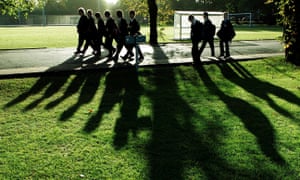
Paul Kelley says young people are losing 10 hours’ sleep a
week, and calls for 8.30am starts for primary pupils and 10 or 11am for
teenagers.
Ignoring young
people’s natural circadian rhythms could lead to exhaustion, frustration,
anxiety and weight gain, says Prof Kelley. Photograph:
School start times
should be put back to as late as 11am to combat a sleep-deprivation crisis
among young people, a scientist has suggested.
Paul
Kelley, of the Sleep and Circadian Neuroscience Institute at the
University of Oxford, said young people in Britain were losing on average 10
hours’ sleep a week, making them more sleep-deprived than a junior doctor on a
24-hour shift.
Speaking at the British
Science Festival in Bradford on Tuesday, Prof Kelley called for
an end to early starts at schools, colleges and university to “improve the
lives of a generation”.
He said children aged
eight to 10 should start school at 8.30am or later, 16-year-olds should start
at 10am and 18-year-olds at 11am.
Kelley has been
working with fellow Oxford neuroscientist Russell Foster and Steven Lockley of
Harvard Medical School to push for a sea-change in the approach to sleep for
children.
They have been
working with the Education Endowment Foundation and the Wellcome Trust on the Teensleep project, which Kelley said was
the largest study of its kind and which is aims to recruit 100 schools to trial
different start times.
The recommendations
arise from a deeper understanding of circadian rhythms – our internal body
clock, which determines optimum levels of concentration, wakefulness and work
ability.
“At the age of 10 you
get up and go to school and it fits in with our nine-to-five lifestyle,” Kelley
said. “When you are about 55 you also settle into the same pattern. But in
between it changes a huge amount and, depending on your age, you really need to
be starting around three hours later, which is entirely natural.”
Ignoring our natural
circadian rhythms could lead to exhaustion, frustration, anxiety, weight gain
and hyper-tension, he said, and could make a person more prone to stimulant or
alcohol use and risk-taking.
“This is a huge issue
for society,” Kelley said. “We are generally a sleep-deprived society but the
14-24 age group is more sleep-deprived than any other sector of society. This
causes serious threats to health, mood performance and mental health.”
Advertisement
If schools across the
UK adopted the new start times, he said, GCSE attainment would rise by about
10%.
The problem goes
beyond merely feeling tired, Kelley said. If a child gets less than six hours
sleep a night, over the course of a week this can lead to more than 700 changes in the way their genes
behave.
Similar changes are
not seen in children who get eight-and-a-half hours sleep a night. He said
illnesses as serious as schizophrenia often developed at an age associated with
the beginnings of sleep deprivation problems.
Kelley said every
governing body of every school in the UK had the power to alter start times if
they wish. He conceded that later school starts might be problematic for
working parents, but added: “The interesting thing is that parents usually
support this. All the studies show that later start times improve family life,
travel times are shorter, it’s safer for children to travel to school.”
Guy Meadows, a sleep
physiologist at the Sleep School in London, agreed there was a problem that
needed tackling. He said: “British children are among the most sleep-deprived
in the world. There was a recent study which looked at 900,000 children
globally. The US was top and Britain came sixth. Sleep is
vitally important for children, and it’s when they develop mentally, physically
and emotionally.”
He said families had
a key role to play in ensuring children get enough sleep. In school sessions
aimed at teaching children how to improve their sleep, Meadows said, 96% of
participants said they used a phone or mobile device in the last 30 minutes
before sleep.
“We’re finding that
children have phones or tablet from the age of about 10 or 11. These devices
emit light which mimics the light from the sun and they essentially trick our
brains into thinking we should be active, not winding down for sleep, and that
interferes with our circadian rhythms,” he said.
No comments:
Post a Comment